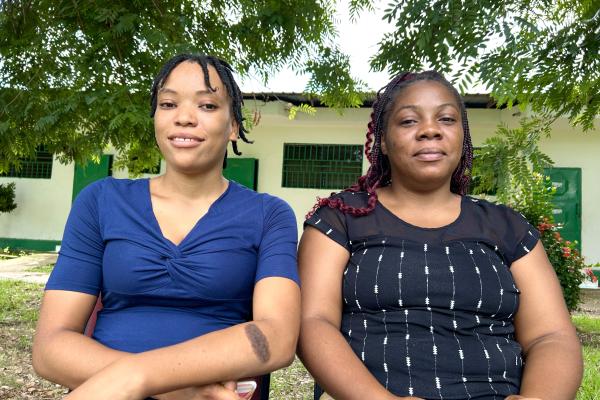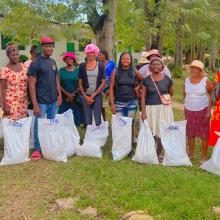It all starts well before arrival. Leaving Port-au-Prince for Thomonde, in the Plateau-Central region, takes time, organization and a certain amount of uncertainty. The roads are long and sometimes impassable. Insecurity makes detours necessary. You have to set off early, stay alert, adapt to the unexpected.
But this road is part of the job. It already says a lot about the conditions under which aid must circulate, about the efforts required to reach the most remote areas. And about the determination of those who choose, despite everything, to go.
On arrival, Ermina C and Yanick VP, social investigators for the FAES/BID/Zanmi Lasante program, quickly settle in. They have come to assess situations of vulnerability in the commune. Their role is to identify families who no longer have resources, those living on the margins, often invisible in the statistics.
This assessment isn’t done behind a desk. You have to go and see. Enter the homes. Take the time to talk, to listen, to understand. Assessments follow a clear protocol, but they require more than questions. You have to establish contact, sometimes fragile, often discreet. In some homes, it’s the details that complete the answers: a pot that’s been put away since the day before, a bed shared by several people, missing medication. You have to be rigorous, but also attentive to what the forms don’t always capture.
Some encounters leave more of an impression than others. Like that of a single mother with five children, no job, no support. Not even enough to cook a meal. At times like these, Yanick keeps her gaze fixed on her notebook to hold back the tears. But she stays focused, because listening is part of helping. And because the simple fact of coming can already create a bond.
The work continues at the Thomonde health center, where Province, a social worker on the program, follows up on the identified cases. He knows the families, the pathways, the emergencies. He is in direct contact with beneficiaries, coordinating aid and answering questions. His role is central: circulating information, checking that food, financial or medical support reaches the right people, at the right time.
Nurse Rose Myriam B. completes the team. She intervenes to assess the health status of program participants. She checks current treatments, spots warning signs, and refers them to healthcare services if necessary. Her visit is often one of the few medical contacts some families will have in the weeks to come.
In Thomonde, as elsewhere, poverty is established, silent. Some families eat only every other day. Others live in isolation, with no passable roads, no drinking water, no medical care. Welfare here is not a luxury. It’s sometimes the only thing that’s left.
For the investigators, this work is demanding. It requires rigor, stamina, but also an ability to remain present in the face of harsh realities. It’s not a job you do from a distance. You have to be there. To listen. Take note. Come back. These are small things, but for the families concerned, they can make a big difference.
Through their visits, their observations, their recommendations, these women help to make visible those who are easily forgotten. Their work doesn’t transform the country, but it does repair something essential: recognition, consideration, the possibility of receiving support without having to claim everything.
Every visit, every case, every gesture counts. So that these teams can continue to reach the most isolated and offer them vital support, make a donation today.

